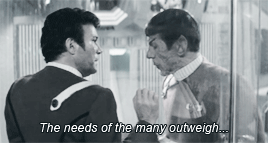Flash525
The Scarlet Messenger
- Joined
- Feb 14, 2018
- Messages
- 6,294
- Reaction score
- 2,727
- Points
- 78
I vividly remember this being discussed here before, but can't find a thread on it so it either wasn't said anywhere, or it was mentioned in comment somewhere to do with another subject.
The Trolley Problem is a thought experiment in ethics. To summarise, it's a question of saving one person, or saving five.
Quoting directly from Wikipedia:
One method requires intervention to save the lives of the five, but condemn the lives of one, whilst the other requires only your ignorance, but one person dies because of it.
There's no workaround. Either one, or five people are going to die.
I've heard this mentioned several times recently, and I always think "the needs of the many" so anyone with any decency(?) would surely pull the lever saving the lives of five, even if it's condoning the life of one.
We don't know these people; we don't know whether they're good, bad, male, female, black, white (etc etc); there are (as you may see through the Wikipedia Article) some extensions or variations of this, but ultimately it's just a simple case of saving five (via intervention) one (by ignorance).
The Trolley Problem is a thought experiment in ethics. To summarise, it's a question of saving one person, or saving five.
Quoting directly from Wikipedia:
There is a runaway trolley barreling down the railway tracks. Ahead, on the tracks, there are five people tied up and unable to move. The trolley is headed straight for them. You are standing some distance off in the train yard, next to a lever. If you pull this lever, the trolley will switch to a different set of tracks. However, you notice that there is one person tied up on the side track. You have two options:
Which is the most ethical choice?
- Do nothing, and the trolley kills the five people on the main track.
- Pull the lever, diverting the trolley onto the side track where it will kill one person.
One method requires intervention to save the lives of the five, but condemn the lives of one, whilst the other requires only your ignorance, but one person dies because of it.
There's no workaround. Either one, or five people are going to die.
I've heard this mentioned several times recently, and I always think "the needs of the many" so anyone with any decency(?) would surely pull the lever saving the lives of five, even if it's condoning the life of one.
We don't know these people; we don't know whether they're good, bad, male, female, black, white (etc etc); there are (as you may see through the Wikipedia Article) some extensions or variations of this, but ultimately it's just a simple case of saving five (via intervention) one (by ignorance).







 t: The trolley scenario is overrated, I meant that it's resolvable by simple math: 5 potential victims minus one assured fatality means it is a choiche between saving 4 people or not.
t: The trolley scenario is overrated, I meant that it's resolvable by simple math: 5 potential victims minus one assured fatality means it is a choiche between saving 4 people or not.
